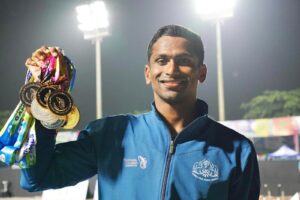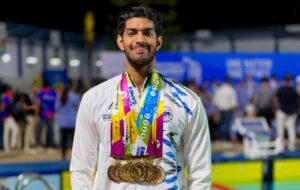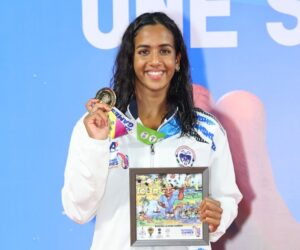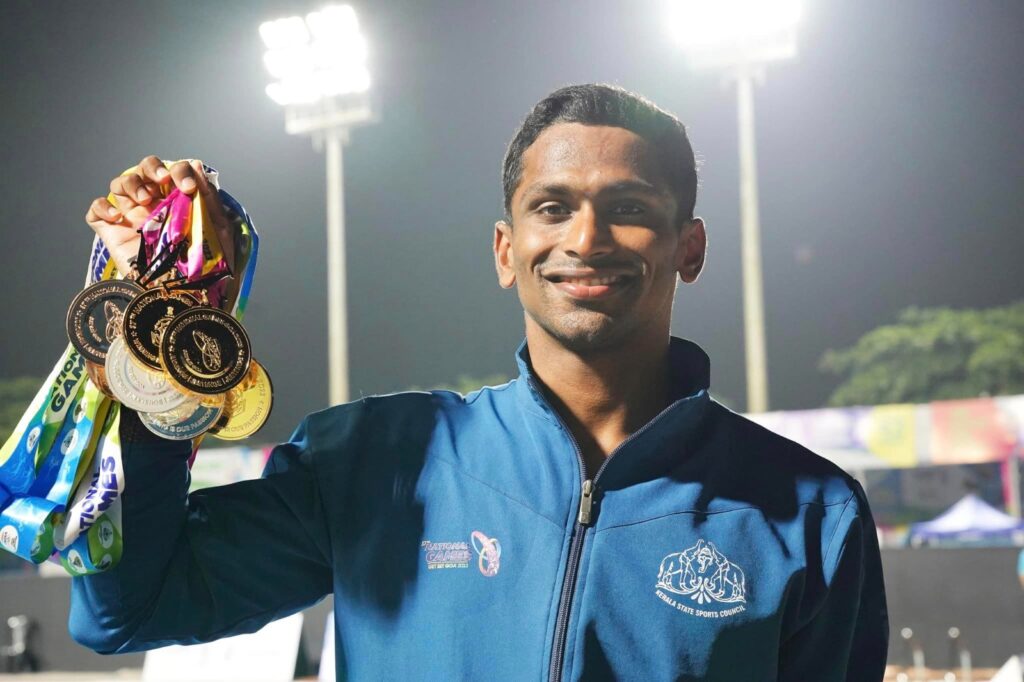
The clutch of medals that they could win, the glory of being in the race for the best athletes’ awards and the limelight that these trophies bring fuelled swimmers to deliver their best at the National Games in Goa, unmindful of the fact that they had trained to peak at the Asian Games which ended in Hangzhou last month.
Sajan Prakash won 9 medals, including 3 golds, 4 silvers and 2 bronzes, while Srihari Nataraj picked up 10 medals, with 4 of his 8 golds coming in the relays. In the women’s section, teenagers Dhinidhi Desinghu (7 golds, 5 of them in relays) and Nina Venkatesh (6 golds, 4 of which came in relays) shared the limelight.
It has been a long season for Indian sportspersons, with the Asian Games as the main focus –
even ahead of the World Championships – for many. And the expectations were of low-key performances in many sports that demand intense training and require athletes to plan their calendars carefully in order to peak in the international competitions of their choice.
And while results from the Athletics Stadium in Bambolim upheld such a theory, the Campal Pool saw some swimmers produce their best performances and others getting close. Venkatesh broke two national records in the Butterfly sprints while Prakash claimed the national record in the 200m Medley.
Some of these displays have taken students of high-performance sport by surprise. But the swimmers themselves offered very interesting insights.
Prakash clocked 2:04.57 in the 200m Medley, shaving more than a second off his previous best of 2:05.83 set five years ago. He had opened the National Games with a season’s best of 53.79 in the 100m Butterfly, his first sub-54-second race in two years.
The deep thinker that he is, Prakash spoke lucidly about being able to crank up good times even at the end of a long season. “Swimmers are under-rated in India, and get precious little scientific support,” he said. “We have to keep racing to know when exactly we have to start tapering for a major international competition and how long its impact lasts on our bodies.”
He made a telling revelation that unlike other athletes who competed in the Asian Games, most swimmers resumed training after a short break. “I trained for 20 days in Dubai on returning from Hangzhou,” he said. “And the reason is the greater attention we get from everyone – State Government, national media and fans – for the National Games, rather than the National championships.”

Nataraj, who had jokingly suggested the he would be better off holidaying in the Maldives after a packed season, surprised himself with a fast 200m Freestyle final, winning gold from Prakash and Aneesh S Gowda. Having clocked a national record of 1:49.05 for the 10th-fastest time in the Asian Games heats, he finished just 0.04 seconds outside it on Sunday.
He confessed that he had not trained much in the month since coming home from the Asian Games. “There has not been any hard training,” he said. “Only enough to maintain the levels I had at the Asian Games. But I think the pool is fast and those of us who came to the coast from the elevation of Bengaluru benefit from that.”
Venkatesh wrested the spotlight with two national records on either side of her 18th birthday. First, the Bengaluru swimmer, who trains in the Dolphin Academy at the Padukone-Dravid Centre for Sports Excellence, clocked 1:02.22 to improve the 100m Butterfly mark set by Maharashtra’s Apeksha Fernandes (1:02.37) in Lima, Peru, in September last year.

Then, in winning the 50m Butterfly in 27.70 seconds, she improved her own national record from the 27.74 seconds she had clocked at the National Championships in Hyderabad earlier this year. Venkatesh showed she had learnt from her Asian Games experience, where she finished the 100m Fly heats in 1:03.89 and 50m Fly heats in 27.80 seconds.
“It is not about training for one competition,” said the class 12 student. “It is about the months, the years that count for training. For the National Games, it was about keeping the mind fresh and competing. Many of the swimmers I competed with in Hangzhou headed to a World Cup in Berlin. If they could compete in back-to-back events, I knew I could do it too and produce some good times.
“I only reminded myself why I was in the sport and do what I love. For me, it was more a mental game than physical. I admit the Asian Games was emotionally draining and it was hard to get back in the groove immediately. I had to flip the switch, stay strong and get through it.”




